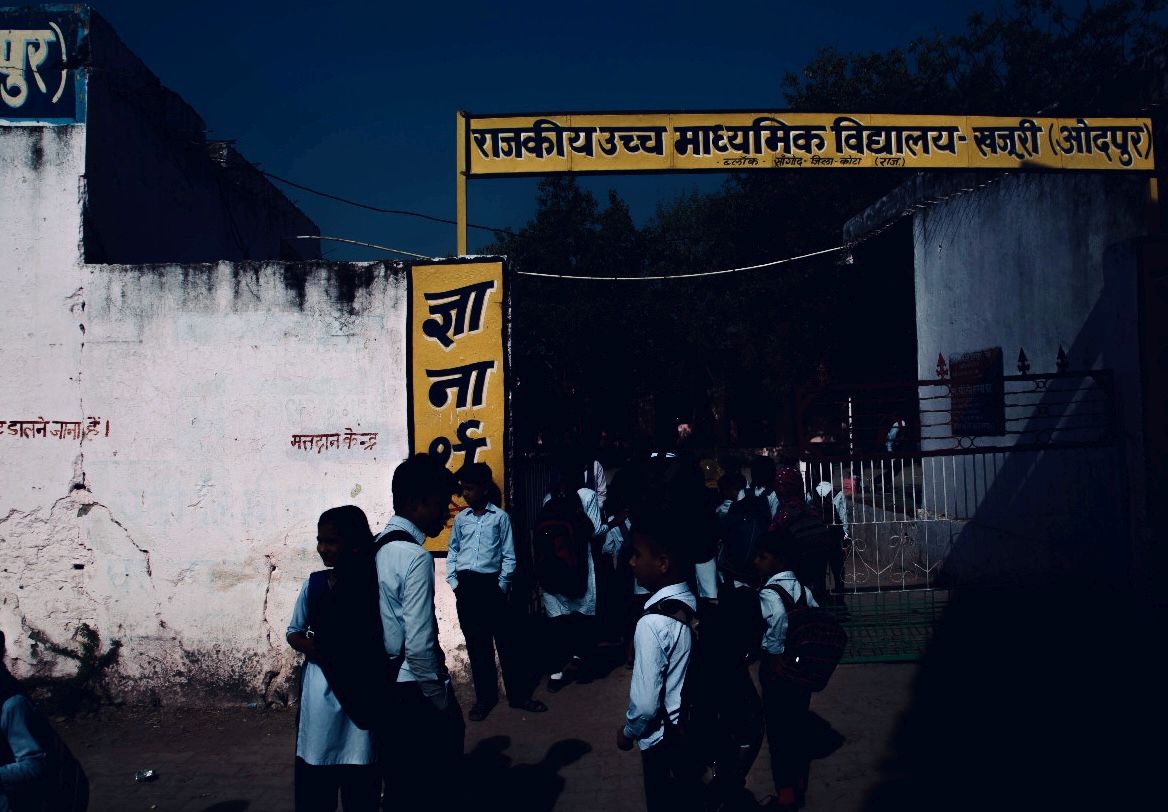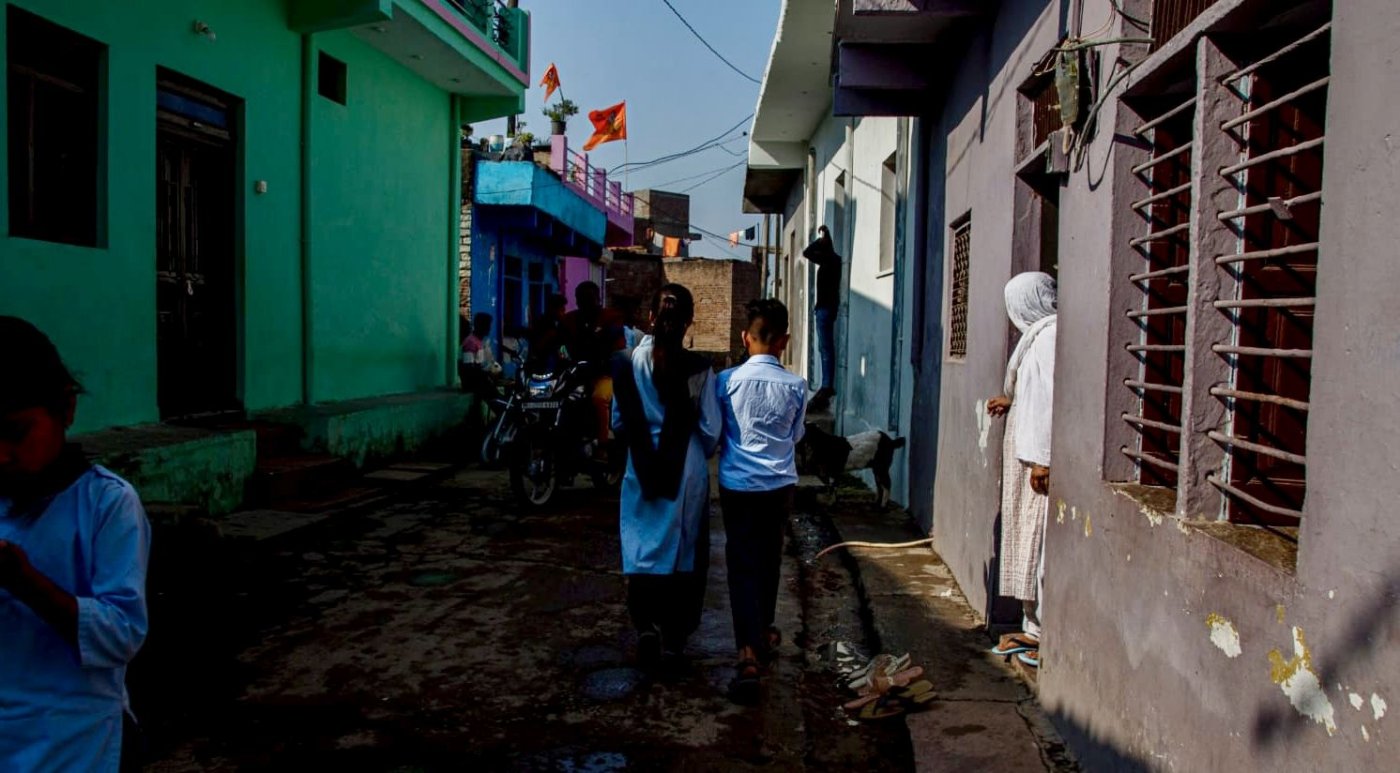Kota, Rajasthan: Days after joining a protest against the suspension of three teachers from her school in Rajasthan—Muslims accused by a Hindu right group of carrying out religious conversions—a Hindu student told us that everything she had learnt about not looking the other way in the face of injustice made it necessary for her to speak out.
Education minister Madan Dilawar suspended Firoz Khan, Mirza Mujahid, and Shabana, who were teaching at the government higher secondary school in Khajuri Odpur village in the southeastern district of Kota.
Students, parents, and teachers maintained that the three were innocent.
“Our teachers taught us that we should always follow the path of truth, no matter how difficult it is,” said a 16-year-old student, who asked Article 14 not to publish her name.
“We are following the same path,” she said. “Lies keep winning, but we will see the truth prevail.”
A 13-year-old Muslim student who said she wanted to be a public speaker one day said she came up with the slogans, “ek, do teen, chaar, bandh karo ye atyachar,” (one two three four, stop this atrocity), nirdosh hai nirdosh hai humary sir nirdosh hai (innocent, innocent, our teachers are innocent), and Shabana ji, Firoz sir, Mirza Mujahid ji ko insaaf do insaaf do (give justice to Shabana, Firoz, and Mirza).
The Muslim student, who asked us not to publish her name, is seen shouting the slogans in a viral video.
A student from class 11, a Muslim who asked us not to publish her name, said she went from class to class to mobilise other students.
On 23 February, a day after the teachers were suspended after a collective of Hindu right-wing groups, the Sarv Hindu Samaj, submitted a memorandum to the state education minister Madan Dilawar, alleging forced conversions, the three students came to school determined to gather support for the teachers that some of the mainstream media were projecting as perpetrators.
The next day, on 24 February, students protested and raised slogans on the school campus against the suspension. The day after that, a group of them walked 20 km to the office of the sub-divisional magistrate (SDM) Kumar Rajawat and submitted a statement in favour of their teachers, demanding action against those who created this controversy.
The protest in Khajuria village comes when India’s rank in surveys that map civil liberties and press freedom worldwide has hit new lows. Those critical of the Bharatiya Janata Party (BJP), the party in power in New Delhi since 2014 and re-elected in Rajasthan last year, have accused Prime Minister Narendra Modi's government of suppressing dissent and weaponising the law against opponents while controlling the media and allowing Islamophobia to spread.
Up to 40% of the 256 students are Muslim, making the school an easy target for the Hindu right, said school principal Kamlesh Bairwa. Twelve of the 15 teachers are Hindu, and they, along with the principal, wrote to the district administration, saying the allegations of “love jihad” were wrong.
“Love jihad”, of which the three teachers are accused, is a conspiracy theory about Muslims misleading Hindu girls into converting to Islam, which has gained traction in the ten years since the BJP came to power.
Hindu groups have fanned the conspiracy theory that Prime Minister Modi’s government said in 2020 was not a crime that legally existed in the country. BJP leaders have used it to fight the election, and Muslim men accused of it have been killed and jailed over it. It has also become more dangerous to be an interfaith couple in India.
Students and their parents told Article 14 how they remained seemingly unaffected by the anti-Muslim propaganda disseminated by the Hindu right and protested despite making themselves vulnerable to possible retaliation and legal persecution.
‘We Have To Stop This’
The people in Khajuri village said that there were no religious tensions between Hindus and Muslims where they lived, and they were angry at the communal situation the Hindu right and the media had created. The narrative only changed when many students, both Hindus and Muslims, publicly rubbished the claim and walked to the SDM’s office.
The Hindu student recalled how one of her classmates motivated other students to join the protest: “She went to every student and told them what happened to our teachers is wrong and we must protest it.”
The Muslim student in class 11 heard the news in the village.
“The next day, I went to school and had a meeting in class regarding the suspension of three teachers over the love jihad conspiracy,” she said.
The teenager recalled telling her fellow students: “It's wrong. We have to stop this. We have to fight for what's right.’”
Then, the teenager said that four of her classmates went from classroom to classroom to tell other students about what was happening and why they should protest.
The next day, when they went to Sangod city to give their memorandum to the SDM, Krishna Kumar Rajawat, the teenager said she saw the police and was initially scared, but she told her classmates to keep walking.
The police did not stop them.
“We want to bring our teachers back. Mujahid sir has been here for so long, and he is always nice,” she said. “The government has to listen to us.”
‘I Am Proud Of My Daughter’
The parents of the students we interviewed said they supported their children.
Ram Dayal, a 50-year-old daily wage labourer and father to the Hindu student, said it was wrong to suspend the teachers without even an inquiry and that they should be brought back.
“I am proud of my daughter for what she did,” said Dayal. “I never expected such events in my small village of Khajuri.”
Mohammad Saleem, a 60-year-old farmer and the grandfather of the Muslim student who studies in class 11, said that if the state were to file a case against them, they were ready to face it.

Support From Colleagues
The Hindu right started causing trouble in the last week of January when students put on a play, “Sarva Dharma Sambhav” (all religions are equal ), for Republic Day.
Scripted by one of the three Muslim teachers, Shabana, the play was about saving the country from people trying to change the country by attacking its secular and pluralistic values.
After that, a video that was suddenly in circulation was said to show a Hindu student being made to wear a skull cap. A television interview with a Hindu student who accused teachers of carrying out forced conversions and prayers went viral. The student later said some unknown people forced them to make false allegations.
Then, news of a Hindu woman and a Muslim man from the village eloping raised communal tensions.
It so happened the woman was a former student of the school, and the admission record showed her marked as a Muslim—something the teachers and the principal said was a human error they fixed.
But it was enough to accuse the Muslim teachers of forcibly converting the Hindu girl and arranging her marriage to a Muslim man. The former student came out and said she was an adult who decided to marry the Muslim man of her own free will and that she was still a Hindu after marriage.
The school principal, Bairwa, and the Hindu teachers have said the link between the marriage and the error in the school records was being forced.
Bairwa told Article 14 that the allegations were “baseless” and contrary to the professional conduct of their Muslim colleagues. Shabana had joined three months earlier.
"I have been here in this school for three years, and I haven't seen anything like what my teachers are accused of,” he said.
‘A Source Of Hope’
Mujahid, a physical training teacher, said the incident had upended his life, and his students' support has meant a lot.
“I was shocked by my suspension, accused of love jihad and influencing my students to offer namaz. It feels like an attack on Muslims,” he said. “My students’ protest is not just a source of hope but also a testament to the impact of my teaching on their lives.”
Firoz Khan, who teaches maths and English from classes one to five, said he had faith in the court but was deeply saddened by these events.
“Never did I imagine this happening to me after 30 years of teaching across six schools…We have lived with harmony,” said Khan, who was awarded the villagers' award on January 26.
“It makes me question why only Muslim teachers are being targeted,” said Khan. “With 12 Hindu teachers around, any genuine concerns would have been reported earlier.”
“Was this what I was destined for?”
A class 11 Hindu girl who was seen speaking to the authorities questioning the suspension said that she didn't feel any fear because she knew that her teachers had done nothing wrong.
“What's the point of speaking up now? What's happened won't change. We won't get our teachers back now,” she said.
(Umar Altaf is an independent Multimedia journalist based in New Delhi. Alishan Jafri is an independent journalist based in New Delhi.)
Get exclusive access to new databases, expert analyses, weekly newsletters, book excerpts and new ideas on democracy, law and society in India. Subscribe to Article 14.

